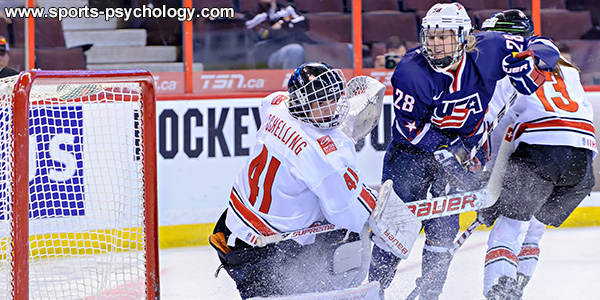USA Hockey Team’s “Gold Medal Mentality”
Summary: In hockey, success isn’t determined solely by talent, speed, or size—it’s mindset that makes the real difference. Athletes who adopt a “gold medal mentality” stay aggressive, focused, and resilient no matter the score, opponent, or pressure.
What separates those who succeed and those who fall short of their goals in hockey?
Talent? Of course, talent is necessary to accomplish goals but there are countless talented hockey players who fall well short of their potential.
Speed? Being fast is certainly an asset but if you are not aggressive, then speed is not much of an advantage.
Size? Being physically stronger than your opponent can benefit your game but if you don’t outwork your opponent then you lose that edge.
So if it is not talent, speed or size that separates those who are successful and those who fall short of their goals, then what makes the biggest difference for hockey players?
The Difference-Maker is your Mindset or How you Approach Each Game
If your mindset is to play aggressively and keep pushing forward, no matter the situation, score, game or opponent until the final whistle, you will achieve much more.
The U.S. women’s hockey team has relied on their ‘gold medal mentality’ during their chase for the gold at the 2018 PyeongChang Olympic Winter Games.
Team USA defeated Finland in the semifinals, 5-0, to land in the gold medal game against their rivals, Canada. U.S. coach Robb Stauber credited the team’s mindset after the semifinal.
STAUBER: “You had to have a gold-medal mentality today. There’s no way you can go out there and do what we did if your foot’s not on the gas. We did things right from start to finish.”
Arch-rival Canada has not lost an Olympic hockey game in 20 years, winning every Olympic gold medal since 2002.
Canada beat the U.S. 2-1 in a preliminary round contest and also defeated the U.S. in the last two gold medal Olympic Games including the Sochi Games where USA blew a late 2-0 lead and lost in overtime 3-2.
USA forward Jocelyne Lamoureux-Davidson won’t allow the past to affect the present. Lamoureux-Davidson’s mentality is full-steam ahead. The U.S. women’s hockey team is heading into battle with a whatever-it-takes mentality.
LAMOUREUX-DAVIDSON: “We’re super excited to be in this position again. We worked four years to put ourselves in position to compete for a gold medal and we’ll enjoy this for a little bit, but we know that this isn’t what we came here for. We’re ready to go to battle in a couple days.”
Gold Medal Mindset:
- I’ll focus on our team’s strengths and our strategy for this game.
- I’ll refocus my mind after mistakes and more forward no matter what happens in the game.
- I’ll fight until the last whistle of the game.
- I’ll choose to play aggressively, not tentatively.
The right mindset often wins when talent, speed, strength and size are equal.
Winning the gold requires that you play with a ‘gold medal mentality.’
4 Tips for Having the Right Mindset
1. Develop a Gold Medal Mindset
Elite hockey players know that success isn’t only about speed or strength—it’s about mindset. Adopting a “gold medal mentality” means staying aggressive, confident, and resilient no matter the game situation.
2. Focus on the Present, Not the Past
Dwelling on past mistakes or previous losses, like Team USA refusing to let earlier defeats to Canada define them, only hurts performance. Instead, maintain a forward-focused hockey mindset that keeps your energy on the next play.
3. Play Aggressively Until the Final Whistle
What separates good players from great ones is the ability to push hard from start to finish. A winning hockey mentality requires keeping your foot on the gas until the last whistle, no matter the score.
4. Build Confidence Through Mental Resilience
When talent, speed, and size are equal, it’s the player with stronger mental toughness in hockey who wins. Building resiliency helps players bounce back quickly from mistakes and continue competing at the highest level.
Start today with learning how to control your focus
Related Sports Psychology Articles:
- How to Develop Growth Mindset
- How to Develop a Positive Mindset in Sports
- The Importance of Your Game-Time Mindset
Free Mental Toughness Reports

Get instant access to a mental game report to improve your mental toughness. Are you making one or more of these “deadly” mental game mistakes prior to competition? You can improve your mental game with one of our free sports-specific reports below.
with our free mental toughness reports, you’ll:
- Discover if you have positive or negative pregame jitters.
- Identify your pre-competition mental game mistakes.
- Learn the important pregame mental skills to boost your performance and success!
Learn how mental game strategies can boost your mental toughness in sports with Dr. Cohn’s free mental game reports!
FAQ: Hockey Success and the Gold Medal Mindset
Q: What separates successful hockey players from those who fall short?
A: It’s not just talent, speed, or size—it’s the mindset. A player who competes aggressively, stays resilient after mistakes, and maintains focus until the final whistle gains the edge over equally skilled opponents.
Q: What is a “gold medal mentality” in hockey?
A: A gold medal mentality means playing with confidence, refusing to dwell on mistakes, staying aggressive, and committing to doing whatever it takes to win. It’s about mental toughness as much as physical skill.
Q: How did Team USA’s women’s hockey team show this mindset?
A: At the 2018 PyeongChang Olympics, Team USA defeated Finland in the semifinals with a relentless approach and entered the gold medal game against Canada with full determination, focusing on the present rather than past losses.
Q: Why is mindset more important than size or speed in hockey?
A: Physical attributes give an advantage, but without the right mindset, they can’t be fully utilized. Aggressiveness, focus, and resilience allow players to maximize their skills and push past adversity.
Q: How can hockey players develop a winning mindset?
A: Players can develop it by focusing on their strengths, creating positive performance cues, bouncing back quickly from mistakes, and committing to aggressive, confident play every shift.
Dr. Patrick Cohn is an expert mental performance coach who has helped athletes for over 30 years enhance their performance. Dr. Cohn earned a master’s degree in sports psychology from CSUF and a Ph.D. from the University of Virginia, specializing in Applied Sports Psychology.

